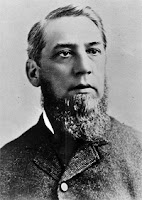Train robbery goes to court
by
Bill Miller for the Mail Tribune Monday, March 25th 2019
Last
week’s column was about the daring night holdup of a Southern Pacific train
north of Riddle, July 1, 1895, and the case came to trial six months later.
Of the three men charged for robbing
the train and stealing the U.S. Mail, John Case was believed to be the masked
man who, with six-gun in hand, brazenly walked the cars of the train, robbing
passengers and the train crew, while partners James and Albert Pool lit up the
sky with a pyrotechnic display outside the train; their dynamite blasts and
gunshots meant to terrorize and intimidate passengers.
Prior to the robbery, Case had just
been released after serving two years in the state penitentiary for
burglary. He had served a previous term for armed robbery. James Pool, Case’s cousin, had been in the penitentiary three times, convicted of horse stealing, extortion and manslaughter. Albert Pool served two years for theft.
burglary. He had served a previous term for armed robbery. James Pool, Case’s cousin, had been in the penitentiary three times, convicted of horse stealing, extortion and manslaughter. Albert Pool served two years for theft.
On the bench in the Portland courthouse
was U.S. District Court Judge Charles Bellinger, who took an active part in the
proceedings, at one point reprimanding the government prosecutor for mentioning
the defendants’ previous convictions in front of the jury.
“The government,” Bellinger said as he
glared at the prosecutor, “ought to be cautious to see not only that justice is
done, but that no error is made!”
By the second day of the trial,
Bellinger was already annoyed with both attorneys.
“Judge Bellinger infused a little
ginger into the cross examinations,” wrote an Oregonian reporter, “by
commenting on the lawyers’ propensity to drag and repeat themselves and go over
and over the same testimony until it became tiresome.”
Conflicting testimony from a number of
witnesses and physical evidence that was questionable left the outcome
questionable. When the jury quickly returned with a guilty verdict for Case and
James Pool and acquittal for Albert Pool, Bellinger expressed his concern.
“I am frank to say that I am not
entirely satisfied with the verdict.”
Bellinger granted the defense an appeal
hearing, and at the end of June 1896 issued a 35-page decision, setting aside
the guilty verdicts and immediately releasing Case and Pool from prison.
Bellinger said the identification of
Case by eyewitnesses “does not tend to similarity, but rather in the opposite
direction.”
Among other discrepancies listed by
Bellinger were horse and boot tracks, allegedly found at a camp believed
occupied by the train robbers before the robbery. Discovered July 2, the tracks
were not compared until July 8 — four days after a heavy rain.
“There is nothing to sustain the guilty
verdict,” he wrote. “It is against the evidence and must be set aside, and it
is so ordered.”
Judge Bellinger may have believed Case
and Pool were guilty, but he was following the law. He said he believed they
were convicted only because of their past criminal history and because evidence
was gathered hastily in pursuit of the $3,000 reward offered by Southern
Pacific Railroad.
The robbery was never solved and never
again went to trial.
















